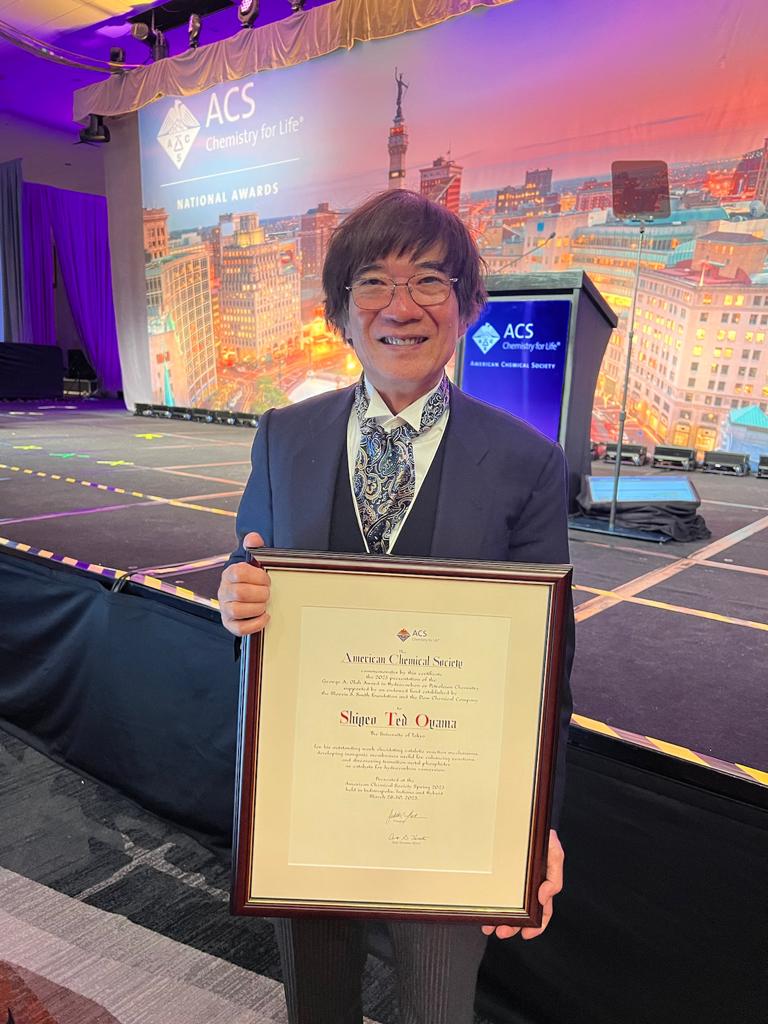Professor emeritus wins prestigious national award from the American Chemical Society
S. Ted Oyama is the 2023 recipient of the George A. Olah Award in Hydrocarbon or Petroleum Chemistry.

Each year since 1948, one chemical engineer across the nation receives acknowledgment for outstanding research achievements in hydrocarbon or petroleum chemistry. In 2023, the American Chemical Society (ACS) bestowed the honor to S. Ted Oyama, professor emeritus of chemical engineering in the College of Engineering at Virginia Tech.
Named after the 1994 Nobel Prize winning chemist, the eponymous George A. Olah Award in Hydrocarbon or Petroleum Chemistry is a prestigious hallmark in a chemist’s career, reserved for exceptional and original research contributions.
Oyama came to Virginia Tech in 1993. He is well known for his research in catalytic fuel processing, selective oxidation of hydrocarbons, volatile organic compound elimination, steam reforming, and membrane processes. In addition, he has developed heterogeneous catalysts and advanced inorganic membranes.
At Virginia Tech Oyama taught courses in undergraduate reactor design and thermodynamics, as well as graduate courses in catalysis and kinetics. He directed 20 doctoral theses, supported postdoctoral associates and international visitors, served on many master’s degree and Ph.D. committees, and helped many students develop successful academic and industrial careers.
The 2023 George A. Olah Award in Hydrocarbon or Petroleum Chemistry is one of numerous accolades and recognitions Oyama has received over his illustrious career, including:
- the Virginia Tech Alumni Award for Research Excellence;
- the Fred W. Bull Professorship of Chemical Engineering;
- the Humboldt Senior Researcher Award;
- the American Chemical Society’s Distinguished Researcher and Storch awards;
- selection to Fellow status in the American Association for the Advancement of Science and the American Chemical Society;
- chair of the Division of Petroleum Chemistry of the American Chemical Society;
- editor of one of the top journals in his field, the Journal of Catalysis, and;
- placement on Stanford University’s list of top 2 percent worldwide researchers.
Additionally, Oyama holds nine U.S. patents and three foreign patents, has co-authored more than 280 peer-reviewed publications, and has brought more than $8 million in research grants to Virginia Tech. In 2021, he was conferred the title of professor emeritus by the Virginia Tech Board of Visitors.
“This award is really big because researchers aren’t only competing with others in their field to receive recognition,” said Sheima Khatib, associate professor of chemical engineering at Virginia Tech. “This award is at the level of the entire organization, which is a huge accomplishment. It’s all of chemistry.”
Khatib counts herself as one of many who benefited from his mentorship.
“Ted and I met at a conference in Spain celebrating the 60th anniversary of a big Spanish leader in catalysis. After watching his presentation at the conference, I was convinced that Ted was the kind of postdoc mentor I was looking for. A year later, funding worked out for me to join him at Virginia Tech,” Khatib said. “When I came here, Ted still had several students finishing their Ph.D.’s, so I was able to work in his lab group for four years. I learned a lot from him in terms of how to perform rigorous scientific research, but also how to effectively communicate research findings for different audiences. Ted has the ability to present complex research on catalytic processes in a way that is engaging and easy to understand. I really admire this and have tried to adapt this skill in the way I communicate about science.”
On working with Oyama over the years Khatib said, “Ted has been a really great mentor to me. He’s not just an incredible scientist, but he is also extremely personable and amiable. This fostered a comfortable mentor-mentee dynamic between us and his encouragement played an important role in inspiring me to pursue an academic career.”
Oyama received his bachelor’s degree from Yale University and a master’s degree and Ph.D. from Stanford University. He currently lives in Japan where he taught at the University of Tokyo from 2010 to 2020. Currently, he holds part-time positions at universities in China and Brazil, and remains editor at the Journal of Catalysis.




